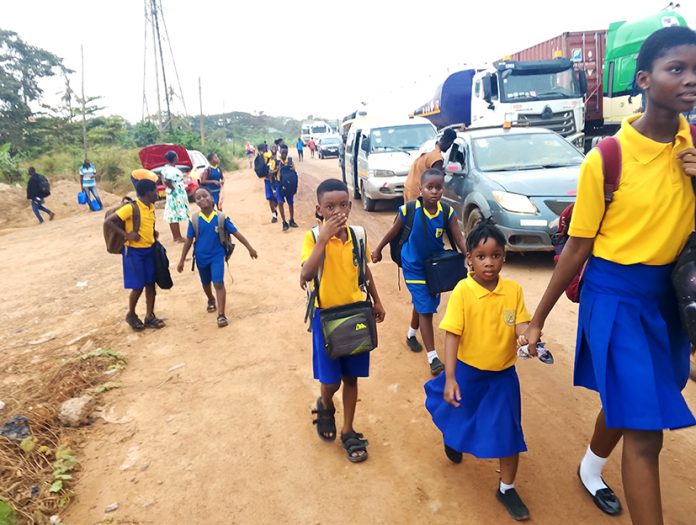Last Friday will be remembered by many commuters on the Takoradi–Agona-Nkwanta highway as a day of tears, frustration and helplessness.
From 1 p.m. until nearly 7 p.m., the bustling stretch of road turned into a nightmare — a long, motionless sea of vehicles baking under the scorching afternoon sun.
No car could move. Not forward, not backward. Both lanes, from Takoradi to Agona Nkwanta were completely gridlocked, trapping motorists, passengers, school buses and even emergency vehicles.
The chaos, witnessed by this reporter and corroborated by eyewitnesses as “the worst traffic in years” was caused by Monpe Ventures, a heavy haulage and equipment rental company, which chose to transport massive industrial machinery in broad daylight, instead of the usual late-night hours.
According to reports, the slow-moving convoy began its journey near Lagos Town, escorted by police officers who attempted to allocate one lane for the operation.
But the effort proved futile. By the time the towering equipment reached Apremdo, it had nearly covered the entire carriageway, leaving no space for oncoming vehicles.
Soon, the inevitable happened, total standstill, children on foot, mothers in tears.
As minutes turned to hours, the human toll began to show. Exhausted passengers abandoned their vehicles and began walking.

School children, some as young as two years old, were seen trekking along the dusty shoulders of the road under the blazing sun.
“This traffic is so bad that I had to walk home,” one stranded commuter lamented. “For hours, not a single car moved.”
Another, a mother named Florence, fought back tears as she spoke to this reporter: “It was heart-breaking seeing children walking from St. Mary’s to Beahu and beyond in the dark, tired and scared, because their school buses were trapped. It was almost 7 p.m. before they reached home.”
Police Say They Were Left in the Dark
When contacted, the Western Regional Commander of the Motor Traffic and Transport Department (MTTD), Paul Bruce Amoah, admitted his outfit had no prior knowledge of the haulage operation.
“I only became aware of the situation after seeing it on social media,” he said. “We were never informed.
“Had my department been notified, I would never have permitted such a movement during the day. These heavy transports are usually done at night when roads are clear.”
Company Defends Its Actions
When this reporter reached out to Monpe Ventures, the company refused to speak to this reporter. It chose to pass a message to this reporter through a colleague, that that it had notified the appropriate authorities by way of informing the Police.
“We informed the Police ahead of time. We cannot be blamed for what happened.”
A Lesson in Negligence
For many who endured last Friday’s ordeal, the incident was more than just a traffic jam, it was a painful reminder of how one company’s poor judgment can paralyse an entire region and endanger lives.
As the sun set over the Western Region that evening, hundreds trudged home on foot — hungry, drenched in sweat, and carrying one haunting memory: a road that became a prison.
Who Takes Responsibility?
But who takes responsibility? The traffic nightmare on the highway was not just an inconvenience, it was a national embarrassment to the extent that for six long hours, one of the Western Region’s busiest routes turned into a scene of confusion, frustration, and neglect.
So, whom do we blame and believe? And more importantly, why was there no proper coordination between the company, the police, and local authorities and GPRTU before undertaking such a massive operation on a major trunk road?
What happened on Friday is not just about traffic — it’s about accountability. Every minute that cars stood still represented not only lost time, but also a collapse in planning, communication, and public responsibility.
This was not an act of God. It was man-made — a result of human error, negligence, and indifference to the plight of ordinary Ghanaians. It is unacceptable that schoolchildren, some barely out of kindergarten, had to walk home in the dark because adults failed to do their jobs.
As usual, there will be no penalty and no one including the company that caused the terrible traffic would be punished.
Never again as the Western Region continues to grow and attract major industrial activity, Friday’s ordeal should serve as a painful, but valuable lesson. Coordination, respect for regulation, and empathy for the public must guide every future operation.
Ghanaians deserve better. Our roads should lead us forward — not trap us in misery.
For more news, join The Chronicle Newspaper channel on WhatsApp: https://whatsapp.com/channel/0029VbBSs55E50UqNPvSOm2z









